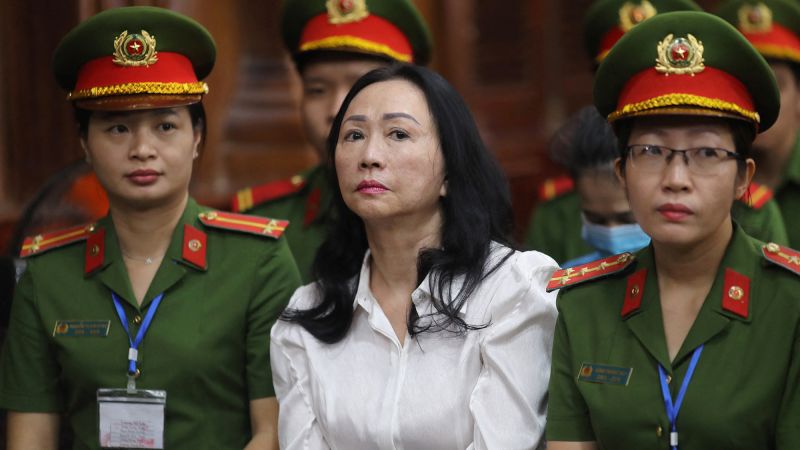Hanoi
CNN
—
A courtroom in Vietnam sentenced actual property tycoon Truong My Lan Thursday to demise over her position in a 304 trillion dong ($12.46 billion) monetary fraud case, the nation’s greatest on file, state media reported.
Her trial, begun on March 5 and ending sooner than deliberate, was one dramatic results of a marketing campaign in opposition to corruption that the chief of the ruling Communist Occasion, Nguyen Phu Trong, has pledged for years to stamp out.
Lan, the chairwoman of actual property developer Van Thinh Phat Holdings Group, was discovered responsible of embezzlement, bribery and violations of banking guidelines on the finish of a trial within the enterprise hub of Ho Chi Minh Metropolis, state media stated.
“We are going to maintain combating to see what we will do,” a member of the family informed Reuters, talking on situation of anonymity. Earlier than the decision he had stated Lan would attraction in opposition to the sentence.
Lan had pleaded not-guilty to the embezzlement and bribery costs, Nguyen Huy Thiep, considered one of Lan’s legal professionals informed Reuters.
“After all she is going to attraction the decision,” he added noting she was sentenced to demise for the embezzlement cost and to twenty years every for the opposite two costs of bribery and violations of banking rules.
Vietnam imposes the demise penalty principally over violent offenses but in addition for financial crimes. Human rights teams say it has executed tons of of convicts lately, primarily by deadly injection.
The Thanh Nien newspaper stated 84 defendants within the case obtained sentences starting from probation for 3 years to life imprisonment. Amongst them are Lan’s husband, Eric Chu, a businessman from Hong Kong, who was sentenced to 9 years in jail, and her niece who received 17 years.
Lan began as a cosmetics dealer on the central market in Ho Chi Minh Metropolis, serving to out her mom, she informed judges in the course of the trial, in accordance with state media.
She later based her actual property firm Van Thinh Phat in 1992, the identical yr when she received married, in accordance with state media.
She was discovered responsible, with her accomplices of siphoning off greater than 304 trillion dong from Saigon Joint Inventory Industrial Financial institution (SCB), which she successfully managed by way of dozens of proxies regardless of guidelines strictly limiting giant shareholding in lenders, in accordance with investigators.
From early 2018 by way of October 2022, when the state bailed out SCB after a run on its deposits triggered by Lan’s arrest, she appropriated giant sums by arranging illegal loans to shell firms, investigators stated.
“The defendant’s actions not solely violate the property administration rights of people and organizations but in addition put SCB below scrutiny, eroding folks’s belief within the management of the Occasion and State,” state newspaper VnExpress cited the jury as saying.
The financial institution is at the moment propped up by the central financial institution and faces a fancy restructuring below which authorities try to ascertain the authorized standing of tons of of belongings which had been used as collateral for loans and bonds issued by VTP. The bonds alone are value $1.2 billion.
A few of the belongings are high-end properties however many others are unfinished initiatives.
Earlier than her fall from grace, she had performed a key position in Vietnam’s monetary world, getting concerned within the earlier rescue of troubled SCB greater than a decade earlier than she contributed to the financial institution’s new disaster.
She was discovered responsible of getting bribed officers to influence the authorities to look away, together with paying $5.2 million to a senior central financial institution inspector, Do Thi Nhan, who was sentenced to life in jail.
Vietnam’s graft crackdown, dubbed “Blazing Furnace”, has seen tons of of senior state officers and high-profile enterprise executives prosecuted or pressured to step down.
Corruption is so widespread that in some provinces many individuals say they pay bribes simply to acquire medical companies in public hospitals, in accordance with a latest survey by the U.N. Growth Program and different organizations.
